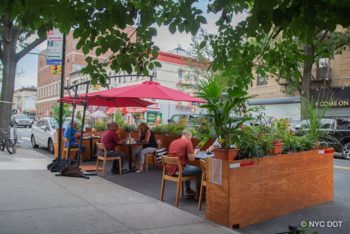
Roadway dining in Bay Ridge. Image Credit: NYC DOT
Over 11,000 restaurants are currently participating in the Open Restaurant Program. Earlier this year, Mayor Bill de Blasio announced four citywide zoning amendment proposals to support small businesses, create more grocery stores and improve accessibility in transit. One of the proposals, the permanent open restaurant zoning text amendment, seeks to establish a permanent open restaurant program by removing the geographic restrictions on where sidewalk cafes can be located.
At the start of the COVID-19 pandemic, thousands of restaurants were closed for indoor dining and limited to take-out and delivery. While these restrictions were created in the interest of safety, the loss of revenue from indoor dining impacted the financial health of restaurants citywide.
The Open Restaurant program was established last summer to help restaurants expand or create outdoor dining structures on sidewalks and in the street near curbs for people to spread out and dine safely. Prior to the pandemic, there were just over 1,000 restaurants citywide that had some form of sidewalk cafe, which had to go through an extended review process. The open restaurant program eliminated the lengthy Department of Consumer and Worker Protection review process, which presently includes potential review by Consumer Affairs, the City Council and Community Boards. The program did not require a participation fee. The Open Restaurant program has saved an estimated 100,000 jobs at over 11,000 participating restaurants. The current Open Restaurant program expires at the end of 2022. For CityLand’s prior coverage of the Open Restaurants program, click here.
If approved, the Permanent Open Restaurants Program will allow restaurants to continue to use the sidewalk adjacent to and curbside roadway space in front of the restaurant for outdoor dining. The program will include both sidewalk and roadway cafes and will be administered by the Department of Transportation.
DOT Commissioner Hank Gutman described the program at the City Planning Commission Review session on June 21, 2021. According to Commissioner Gutman, all restaurants with ground floor space are eligible to apply for year-round access to sidewalk or roadway space. The hours of operation must be consistent with what the Department of Consumer and Worker Protection allows for now, which is through midnight on Sundays through Thursdays and until 1 AM on Fridays and Saturdays. Outdoor dining spaces must be ADA compliant and will be subject to clear path and siting criteria and distance from obstructions. For roadway cafes, setups will be allowed in parking lanes except for certain prohibited zones, and the set up must maintain public safety with access to hydrants and visibility of traffic signs.
The Department of Transportation would establish an office to administer the program. Restaurants would be given four-year licenses and can apply online. While there will still be a public review process, it would not be as lengthy as the current public review process for sidewalk cafes prior to the temporary Open Restaurants Program. The details of that public review process will need to be established through changes to agency rules by the Department of Transportation and local law by the City Council.
Currently, the proposal is before local community boards. Community boards have until September 28th to hold hearings and vote on the proposal before the proposal returns to the City Planning Commission for public hearing and approval. In addition to the public review process, the Department of Transportation is still accepting public feedback about the current Open Restaurants Program and will use the feedback to help shape the Permanent Restaurants program.
CityLand plans to follow up with a post that tracks the community board votes.
By: Veronica Rose (Veronica is the CityLaw fellow and a New York Law School graduate, Class of 2018.)

